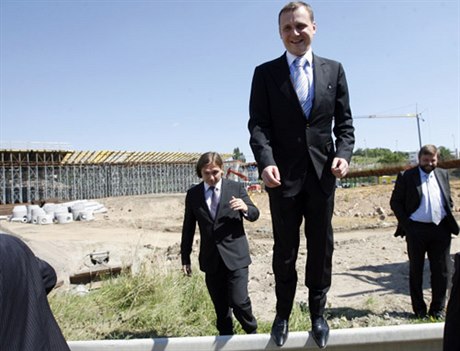The Transport Ministry since last summer has been looking to freeze dozens of construction projects, including the completion of part of the D3 highway in South Bohemia, in a bid to cut costs. But pulling the plug on ongoing projects is not as simple as Transport Minister Vít Bárta (Public Affairs, VV) makes it sound.
According to contractual conditions, it is next to impossible to halt construction without the consent of the builders, and acting unilaterally in this regard would could the state treasury dearly. The question is whether Bárta’s subordinates have left him in the dark regarding this reality or whether he is merely playing the populist card. Whatever the case, it will be harder to find common ground the longer he treats them like dirt.
The construction of large-scale infrastructure is governed by set conditions in a standardized Red FIDIC (International Federation of Consulting Engineers) contract. This is nothing uniquely Czech, but rather an international standard that was first used in 1957 and specifies under which conditions a party may withdraw from a contract.
In the case of the client, in this case the Road and Motorway Directorate (ŘSD), it is only possible only if the contractor, i.e., the construction company, is failing to meet its obligations. This is decidedly not the case: In the current downturn, construction companies in the Czech Republic are fighting for every order.
The contractor may, according to the Red FIDIC, terminate the contract if the work has been disrupted or suspended for more than 112 days. “In this case, the company is entitled to reimbursement of all costs incurred,” Petr Svoboda, manager of the Road Contractors Association of Prague, told Czech Position.
A further complication to the unilateral suspension of construction works is the fact that it is impossible to call a new tender to work on a stretch of highway already contracted out to winning bidder. “There are clearly defined reasons for when the customer can withdraw from a contract. They don’t include a case where the only reason for withdrawing is to award a contract to another firm,” Svoboda said.
Bárta’s bon mots
Bárta announced in August 2010 that construction work would stop on certain sections of highways. His public pronouncements were accompanied by flowery words that he wouldn’t let the construction companies starve but that he would demand discounts from builders. Thus far, however, neither the Transport Ministry nor the ŘSD has made clear how as state officials they intend to persuade the companies to agree to new conditions. Bárta’s office said it’s a matter for the ŘSD — although it was the minister who heralded the halt in construction.
In response to Czech Position’s questions, the press office of Bárta’s office said that the matter fell within the authority of the ŘSD — although it was the minister himself who heralded the halt in construction. But the path forward isn’t clear to the Road and Motorway Directorate, either.
“In the nearest future, we will meet with the companies have been forced to suspend construction of motorways sections that are not included in the transport ‘super conception.’ We will try to agree with them on changes to contracts or appendices,” ŘSD spokeswoman Martina Vápeníková said. “I can’t say more than that at the moment.”
Apart from being difficult to bring about, halting ongoing construction is also an expensive proposition. The cost of guarding and preserving sites can run into the millions of crowns per contract; obviously, the affected construction companies are not going to want to be the ones to pay.
It will depend on how the companies agreed with the ŘSD. Builders of course want to keep building. Previously, the Ministry of Transport offered a compromise — dividing some sections of road into shorter contract periods, which in certain cases it was willing to temporarily finance their completion. However, Bárta’s department hasn’t yet officially responded.
Builders more cautious
“Given that we have not yet been formally presented with concrete steps, we cannot comment on the intentions of the contractors, as presented through the media,” said Ivan Štočková, a spokesman for construction company Eurovia, echoing the caution and uncertainty within the affected sector. “It will be necessary to proceed based on the individual circumstances of the project, contract documentation and the stage.” ‘Our aim is to agree with the ŘSD on a reasonable method of conserving the realized building sites.’
Skanska spokeswoman Lucie Nováková explained that in the case of a temporary suspension of a project, the company proceeds according to the content of the signed contract. “Even at this time, it is our duty to take care of the building to avoid damage or deterioration that would result in additional costs. Our aim is to agree with the ŘSD on a reasonable method of conserving the realized building sites, so that it is possible in future to continue with the work already carried out, and thus to prevent its complete destruction,” she said.
If the ŘSD intends to terminate a contract and then have the work resumed in future by a different company, the state would be violating contractual conditions, Nováková said. “In such a case, it is legitimate that the builder seeks compensation from the contractor for damages and lost profit,” she said.
As with any business, construction companies need to defend the interests of their shareholders. The Road Contractors Association’s Svoboda said that most construction companies haven’t sought damages or even charged for late payments — yet. “They will definitely want to be compensated for completed work and costs associated, for example, with the preservation of construction works or transfer of capacity.”
Bárta’s task now is certainly not any easy one. He must seek advice on how to continue to build infrastructure while cutting the budget. But his method, which ignores contracts that have already been signed, in extreme cases could result in international arbitration.





